Photo shows Mars rover descent
- Published
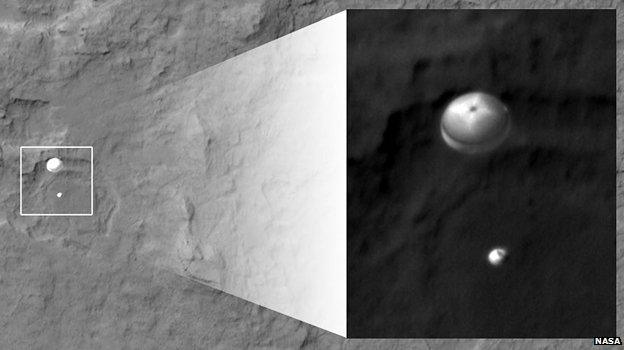
The descending rover was about 340km from MRO at the time the picture was taken
A spectacular image of the Curiosity rover descending to the surface of Mars on its parachute has been obtained by an overflying satellite.
The Mars Reconnaissance Orbiter played a key role in Monday's (GMT) historic landing by recording telemetry from the robot as it approached the ground.
But Nasa also tasked it with trying to get a picture of the new arrival.
The rover - also known as the Mars Science Laboratory, MSL - is seen when still inside its protective shell.
Moments after this image was acquired, the vehicle would have dropped out of the capsule to ride its rocket-powered crane to the base of Gale Crater, its landing location.
This remarkable piece of photography repeats MRO's effort in 2008 when it also managed to sight the incoming Phoenix lander.
John Grotzinger: Soil may be early sample target
Its prime instrument for the purpose is the High-Resolution Imaging Science Experiment (HiRise).
"This image was taken six minutes after MSL entered the atmosphere, and MRO was about 340kmaway from MSL at the time the picture was taken," said Sarah Milkovich, one of the scientists on the camera instrument.
"You can see the lines on the parachute; you can see the hole on the top.
"HiRise has taken over 120 pictures of Gale as part of the landing site selection and characterisation process but I really think this is the coolest one."
The one-tonne Curiosity rover landed on a virtually flat surface in Gale - a deep depression near the planet's equator - at 06:32 BST; 05:32 GMT (22:32 PDT, Sunday).
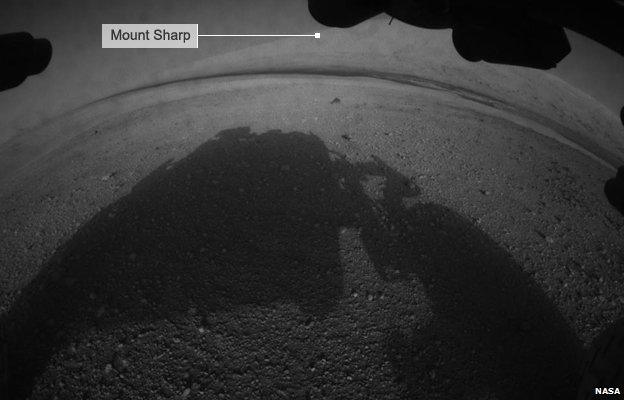
The front camera can just make out the line of Mount Sharp
After a journey of almost 570 million km from Earth, it came to rest no more than 2km from dead centre of its targeted touch-down ellipse, and is now pointing in an east-southeast direction.
This landing location is on the northern side of Gale's central mountain, informally known as Mount Sharp, and relatively close to a dune field.
The mission's project scientist John Grotzinger said the first pictures from the rover had a recognizable look about them.
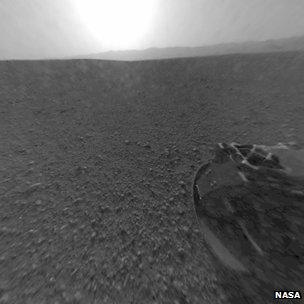
The rim of Gale Crater is about 20km from the rover
"You see a scene that's very familiar to you from other images of Mars - what is undoubtedly a windswept plain with coarse fragments left behind. The science team is initially impressed by the rather uniform grain-size distribution of the coarser particles."
This soil might be a target for early sampling and analysis by the rover's onboard laboratories, he added.
Although MSL's first pictures concentrate on the ground beneath the vehicle for engineering reasons (the images are acquired by hazard cameras), their wide-angle view means it is just possible to make out topographic features on the horizon.
One picture taken from the back of Curiosity contains an outline of the rim of Gale Crater. A picture taken from the front of the vehicle appears to show the relief of Mount Sharp.
The mission team plans to spend the next days and weeks shaking down the vehicle and its instruments.
The plan eventually is to take the rover to the base of Mount Sharp where it is expected to find rocks that were laid down billions of years ago in the presence of liquid water.
Curiosity will probe these sediments for evidence that past environments on Mars could once have favoured microbial life.
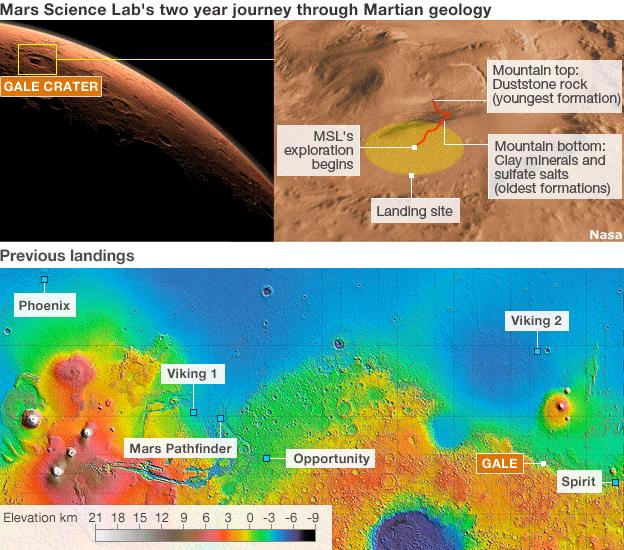
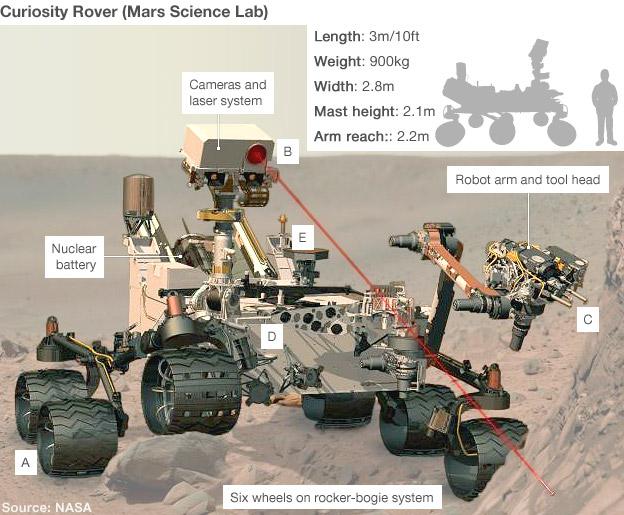
(A) Curiosity will trundle around its landing site looking for interesting rock features to study. Its top speed is about 4cm/s
(B) This mission has 17 cameras. They will identify particular targets, and a laser will zap those rocks to probe their chemistry
(C) If the signal is significant, Curiosity will swing over instruments on its arm for close-up investigation. These include a microscope
(D) Samples drilled from rock, or scooped from the soil, can be delivered to two hi-tech analysis labs inside the rover body
(E) The results are sent to Earth through antennas on the rover deck. Return commands tell the rover where it should drive next
Jonathan.Amos-INTERNET@bbc.co.uk and follow me on Twitter, external
- Published6 August 2012
- Published5 August 2012
- Published4 August 2012
- Published25 May 2012
- Published30 July 2012
- Published4 August 2012
- Published12 June 2012
- Published26 November 2011
- Published24 November 2011
- Published22 July 2011